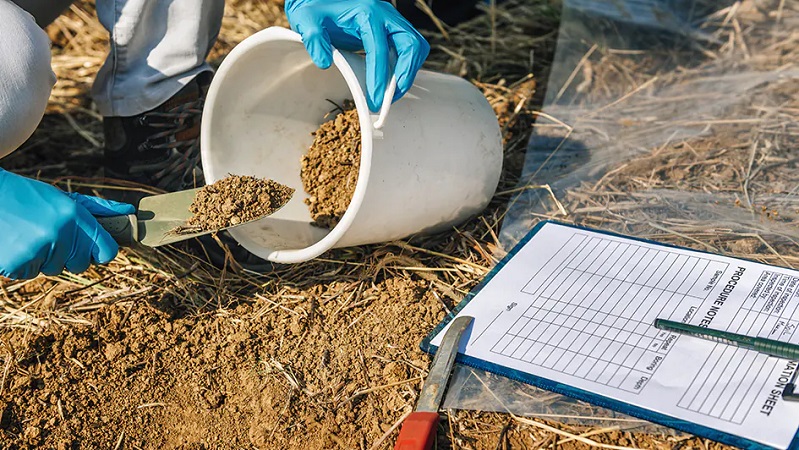
Innovative Solutions to Improve Soil Fertility and Quality
Soil plays a crucial role in providing our food. With the world’s population growing and climate changes occurring, it’s more important than ever to improve the quality and fertility of our soil. In this context, using new strategies can help farmers maintain and improve their soil, leading to better crop yields. In this article, we will explore the latest solutions for increasing soil fertility and improving agricultural soil quality.
The role of soil in crop production
The role of soil in growing crops is very important for food production and global food security. Soil serves not only as a base for plant growth but also provides essential nutrients, water, and oxygen for plant roots. Having the right soil structure and biodiversity helps plants grow more effectively and produce high-quality crops.
Fertile soil has characteristics like the right texture, sufficient organic matter, and a balanced structure, which can improve water retention and prevent erosion. These features enable farmers to make the best use of resources and achieve maximum yields from their fields. Additionally, healthy and fertile soil can support sustainable agricultural ecosystems and help prevent pollution and environmental degradation.
Today, we face challenges like climate change and the depletion of natural resources. Therefore, paying attention to soil fertility and improving its quality is more important than ever.
What is the importance of the physical and chemical properties of soil for its fertility?
The physical and chemical properties of soil refer to the characteristics that greatly affect how soil is structured and how it functions. These properties can directly influence plant growth and development, the soil’s ability to hold nutrients and water, and the activity of soil microbes.
Understanding these physical and chemical properties helps farmers and researchers gain a better insight into the condition of the soil, allowing them to develop effective management strategies for it.
Introducing Soil Physical Properties
- Soil Texture: Soil texture refers to the ratio of sand, silt, and clay particles in the soil. It affects how well water and nutrients can move through the soil. Soils can be classified into sandy, clayey, and silty types. To achieve high agricultural productivity, it’s best to grow plants that are suited to the specific soil texture.
- Soil Structure: Soil structure describes how soil particles clump together. Good structure improves air flow and water movement in the soil, which is essential for plant root growth. Organic matter, cover crops, crop rotation, and proper irrigation methods all help improve soil structure.
- Soil Moisture: Soil moisture indicates the amount of water present in the soil. It influences plant growth and the activity of soil microbes. The soil’s ability to retain water depends on its texture and structure.
- Soil Density: Soil density is the ratio of the mass of the soil to its volume. Proper density helps maintain moisture and prevents soil compaction.
- Permeability: Permeability is the soil’s ability to allow water and air to pass through. Soils with high permeability are better for irrigation and drainage. Factors like soil texture, structure, moisture, organic matter, and compaction all affect soil permeability.

Introducing Soil Chemical Properties
- Soil pH: Soil pH measures the acidity level of the soil. It significantly affects how easily plants can access nutrients and influences microbial activity in the soil.
- Cation Exchange Capacity (CEC): CEC describes the soil’s ability to absorb and hold onto cations, which are positively charged nutrients. Soils with high CEC can retain more nutrients, making them more fertile.
- Organic Matter: This refers to the percentage of organic materials in the soil, which helps improve soil structure and fertility. Organic matter releases nutrients and helps retain moisture. One important step in preparing agricultural land for planting is ensuring the soil has enough organic matter.
- Nutrients: Nutrients include both macro and microelements that are essential for plant growth. A lack of these nutrients can lead to lower crop yields and poorer quality produce.
- Carbon to Nitrogen Ratio (C:N): This ratio indicates the balance of carbon and nitrogen in the soil, which affects the decomposition of organic matter. A suitable C:N ratio enhances microbial activity and helps break down organic materials effectively.

The Role of Ammonium Sulfate in Increasing Soil Fertility
Ammonium sulfate is a common chemical fertilizer known for its high nitrogen and sulfur content, playing a vital role in enhancing soil fertility and improving plant growth. Here are the key ways ammonium sulfate contributes to soil fertility:
- Providing Nitrogen:
Ammonium sulfate is a readily available source of nitrogen for plants. Nitrogen is essential for plant growth and development, especially during the early stages, as it greatly influences the growth of stems and leaves. By supplying enough nitrogen, plants can grow effectively and achieve higher yields. You can also plant some nitrogen fixing plants. - Supplying Sulfur and Enhancing Soil Fertility:
Ammonium sulfate is a good source of sulfur, which is necessary for protein synthesis and enzyme activity in plants. As a micronutrient, sulfur is important for chlorophyll production and improving the quality of crops. The presence of sulfur in the soil also helps enhance the flavor and aroma of agricultural products. - Regulating Soil pH:
Ammonium sulfate can help lower the pH of alkaline soils. This improvement allows better access to nutrients and enhances microbial activity in the soil. Soils with the right pH provide better conditions for plant growth, and controlling pH also helps manage soil salinity. - Increasing Water Retention Capacity:
Using ammonium sulfate can boost microbial activity and the breakdown of organic matter in the soil. It improves soil structure and increases its ability to retain water. With better water retention, plants become more resilient to drought and water scarcity. - Activating Soil Microorganisms:
The nitrogen and sulfur in ammonium sulfate can stimulate microbial activity in the soil. These microorganisms play a crucial role in decomposing organic matter and releasing nutrients.
As explained, ammonium sulfate is an important chemical fertilizer that can effectively increase soil fertility and enhance plant growth. By providing nitrogen and sulfur, regulating pH, and improving soil structure, it boosts the yield and quality of crops. Therefore, farmers should use ammonium sulfate appropriately based on the needs of their soil and plants. To determine the soil’s need for nitrogen and sulfur, soil testing should be conducted. In soil testing, samples are taken from the soil and analyzed in a laboratory. The test results indicate the condition of the soil and what it needs.

The Impact of Ammonium Sulfate on Soil Microflora
Soil microflora refers to the community of living microorganisms in the soil, including bacteria, fungi, and other microbes. These microorganisms play a vital role in maintaining soil health and increasing its fertility. The use of ammonium sulfate as a chemical fertilizer not only positively affects plant growth but also significantly impacts soil microflora. Here are the main effects:
- Stimulating Microbial Activity:
Ammonium sulfate serves as a rich source of nitrogen for microorganisms. The nitrogen in this fertilizer boosts the activity of nitrogen-fixing bacteria which are important in the soil nitrogen cycle. Having enough nitrogen increases the number and diversity of microorganisms, which helps improve soil quality. - Enhancing Decomposition Processes:
Ammonium sulfate can stimulate the activity of decomposer microorganisms. These microbes break down organic matter and release nutrients that plants can use. As microbial activity increases, more nutrients are added to the soil, which contributes to improved soil fertility. - Influencing Microbial Balance:
Adding ammonium sulfate affects the microbial balance in the soil. Some microorganisms may thrive in response to increased nitrogen and sulfur, while others may decrease. The rise in nitrogen and sulfur can lead to greater microbial diversity, which helps stabilize the soil ecosystem. - Impacting Soil pH and Chemical Conditions:
Ammonium sulfate can help lower the pH of alkaline soils. This change can create better conditions for microorganisms, as most thrive in neutral to slightly acidic pH levels. - Responding to Environmental Conditions:
Active microorganisms in the soil can help plants cope with environmental stresses, such as drought and disease. With increased microbial activity, the soil can better respond to climatic and environmental changes.
In summary, using ammonium sulfate as a chemical fertilizer not only promotes plant growth but also significantly affects soil microflora. It stimulates microbial activity, enhances decomposition processes, and helps regulate pH, all of which contribute to maintaining a balanced soil ecosystem and improving soil fertility. Therefore, proper management and optimal use of ammonium sulfate can enhance soil quality and performance.